Stranger Than Fiction (Marc Forster, 2006)


THE WHERE:
At the Empire World Exchange with Krystle and Sarah. Spur of the moment thing for me, they were originally going to see Happy Feet then I got invited and ended up ruining everyone's plans by saying that I didn't want to see it :) Fortunately they both agreed to watch Stranger than Fiction.
THE WHY:
I hadn't planned on seeing this film at all. While I was a fan of Will Ferrell, the trailer didn't peek my interest. I felt pretty fed up with "quirky" films that didn't seem to offer very much else, which is what the trailer made the film out to look like. Then the reviews started pouring in. All of them seemed to not simply be positive but pretty glowing in describing the film as smart, philosophical, existentialist etc. So I figured let's give it a shot.
THE UGLY:
Despite what its title might imply, Stranger Than Fiction is, at heart, traditional fiction. A feel-good narrative film in which our sympathetic protagonist - to paraphrase Kelly Clarkson - takes a chance, makes a change, and breaks away (while improbably getting the girl and learning to play a little guitar along the way). Despite all the marketing efforts, not to mention the script itself, all this intellectual and philosophical narrative justification never manages to fully succeed in making us forget this, and thank goodness for that, because Stranger Than Fiction is one of the better uplifting stories with one of the best sweet-natured romances (both figuratively and literally!) to hit mainstream screens in quite awhile.
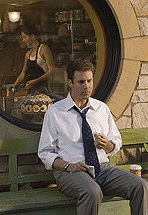 The film wastes no time in trying to fool us into thinking that its intellectual roots runs deeper than they actually do: quickly introducing us to our hero, Harold Crick (Will Ferrell) and his wrist watch, the symbol of his mechanical day-to-day life, replete with some clever graphical overlays just to make sure that we don't miss this point. Later on we're introduced to Katherine Eiffel (Emma Thompson) and Dr. Hilburt (Dustin Hoffman) who round out the film's highbrow branches to philosophy and literature, respectively.
The film wastes no time in trying to fool us into thinking that its intellectual roots runs deeper than they actually do: quickly introducing us to our hero, Harold Crick (Will Ferrell) and his wrist watch, the symbol of his mechanical day-to-day life, replete with some clever graphical overlays just to make sure that we don't miss this point. Later on we're introduced to Katherine Eiffel (Emma Thompson) and Dr. Hilburt (Dustin Hoffman) who round out the film's highbrow branches to philosophy and literature, respectively.The film's admittedly clever and original premise - an author writing the story of a real person - never ends up being much more than that, a mere premise. Sure the wrist-watch is thrown in from time-to-time and made out to be a quirky (there's that word again) character in itself, but its appearances have more to do with the film reminding us that it's being clever and thought-provoking without actually being either. Likewise, there is very little meat to extract from Eiffel or Hilburt's scenes. Despite her numerous scenes, we learn nothing from Eiffel's character except that she is trying to find an ending. But this is no 8 1/2; we constantly hear Eiffel whining about her struggles but there are no insights into her struggle (and I don't even like 8 1/2!)
The good news is that these failed attempts don't hurt the film at all. The filmmakers haven't put all their eggs in one basket and relied on the original premise to get us through. Even when you strip away the philosophical mumbo-jumbo from the Eiffel and/or Hilburt scenes, the dialogue and the actors are enough to keep us entertained and occupied. And to be fair, I'm sure that much of the freshness of these scenes can be attributed to the film's original premise - although I wonder how well they would hold up under repated viewings. I say all this because I want to emphasize how good the rest of the film is, good enough to make us forget these other pedestrian scenes.
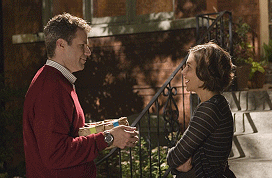 Will Ferrell and Maggie Gyllenhaal are the heart & soul of this movie and their scenes alone could justify the film's existence. Credit needs to be given to director Marc Forster for at least recognizing when to be quirky and when to play it simple which is pretty how much how he plays all of Harold and Ana's scenes. Forster knows the value of silence. The milk & cookies scene is without a doubt the best in the entire movie. It brings a level of naive sincerity and is played so quietly, honestly and intimately that you'd have a hard time finding this sort of scene in any sort of film these days, mainstream or art. Forster directs the later "I want you" scenes the exact same way, at night, without any sound or distractions, completely relying on the actors and their words and the result pays off in spades. Despite all the self-consciousness of the film, Forster really buckles down when it comes to these romantic scenes, never once breaking with Harold's sincerity, even as he utters "I want you" over and over. The first time he says it, we laugh and so too does Ana, when he says it again we start thinking he might be serious, when he says it the third or fourth time we've been won over by his (and Forster's) utter sincerity.
Will Ferrell and Maggie Gyllenhaal are the heart & soul of this movie and their scenes alone could justify the film's existence. Credit needs to be given to director Marc Forster for at least recognizing when to be quirky and when to play it simple which is pretty how much how he plays all of Harold and Ana's scenes. Forster knows the value of silence. The milk & cookies scene is without a doubt the best in the entire movie. It brings a level of naive sincerity and is played so quietly, honestly and intimately that you'd have a hard time finding this sort of scene in any sort of film these days, mainstream or art. Forster directs the later "I want you" scenes the exact same way, at night, without any sound or distractions, completely relying on the actors and their words and the result pays off in spades. Despite all the self-consciousness of the film, Forster really buckles down when it comes to these romantic scenes, never once breaking with Harold's sincerity, even as he utters "I want you" over and over. The first time he says it, we laugh and so too does Ana, when he says it again we start thinking he might be serious, when he says it the third or fourth time we've been won over by his (and Forster's) utter sincerity.I have to say too that I was completely bowled over by Maggie Gyllenhaal. I suppose I'm open to the possibility that it's simply because I found her adorable (which I never had before) but I'd like to think that a lot of it had to do with the little things her character did that serve to make her seem less static: Conscious decisions like giving the "anarchist's have a group?" speech with that sweet yet condescending smile. She doesn't just play it straight ("ok, I despise this guy, so everything I say or do must express this!). And when she finds herself on the bus with Harold and gets thrown into the seat beside him, she can't help but crack a smile about the situation, like finding yourself in an elevator alone with someone you hate, which certainly elicits less laughs than the typical evil-eye glare some other directors might have insisted their actresses perform, but builds a better sense of a complex character as a result. The script lets a lot of characters down but hers is not one of them.
It's a real testament to the good parts of the film that they manage to make us forget about the more numerous pedestrian or useless scenes. And even when we realize that a woman like Ana would likely never fall for a guy like Harold, we don't care anymore. Stranger Than Fiction's unbelievable romance works not simply because it doesn't try to justify it but precisely because of that. Hopefully the success of this film with audiences so far can be seen a reminder to Hollywood screenwriters (Stranger Than Fiction's own Zach Helm included) that they don't necessarily need to learn new tricks to make a very good movie, maybe they just need to learn the old ones better.
Resources:
- Review - Stephanie Zacharek (Salon.com) (i.e. my sentiments exactly, [sigh]
, why do I bother writing at all?) - Trailer Mashup: Stranger Than Fiction / Harry Potter (good times)
Labels: Reviews
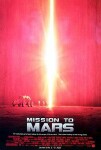

 With this film, De Palma reminds us that film is primarily a visual art form. An obvious fact, right? You would think so. Even many critics seem to not get it. They talk about a film's visual beauty in terms of other mediums. When they say that
With this film, De Palma reminds us that film is primarily a visual art form. An obvious fact, right? You would think so. Even many critics seem to not get it. They talk about a film's visual beauty in terms of other mediums. When they say that  Watching the scene with the killer vortex again, a sequence where any director would be justified in throwing in a bit of action for the sake of entertainment, De Palma instead plays it about as serene as one could play a scene like that. Even as it's sucking up the astronauts, the overall tone of the scene is less about kinetic energy or suspense, and more about a sense of wonderment. It's as if De Palma himself is oblivious to what is happening plot-wise and is just as curious as the astronauts are as to what this strangely beautiful thing is. Even in the midst of the suspenseful scene where the astronauts are desperately trying to fix the oxygen leak, De Palma is willing to spend just as much time on the "visual rhapsody" of the film that he's able to find in the graceful manner in which the astronauts move about in zero-g or even the soda spiralling out of the hole in the spaceship.
Watching the scene with the killer vortex again, a sequence where any director would be justified in throwing in a bit of action for the sake of entertainment, De Palma instead plays it about as serene as one could play a scene like that. Even as it's sucking up the astronauts, the overall tone of the scene is less about kinetic energy or suspense, and more about a sense of wonderment. It's as if De Palma himself is oblivious to what is happening plot-wise and is just as curious as the astronauts are as to what this strangely beautiful thing is. Even in the midst of the suspenseful scene where the astronauts are desperately trying to fix the oxygen leak, De Palma is willing to spend just as much time on the "visual rhapsody" of the film that he's able to find in the graceful manner in which the astronauts move about in zero-g or even the soda spiralling out of the hole in the spaceship.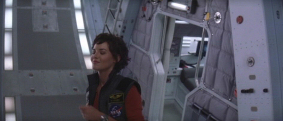 I think of the space dancing sequence preceded by
I think of the space dancing sequence preceded by 

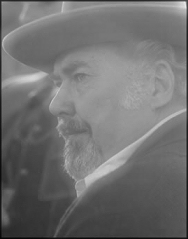 Today,
Today, 


